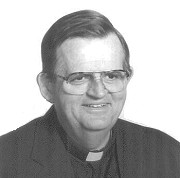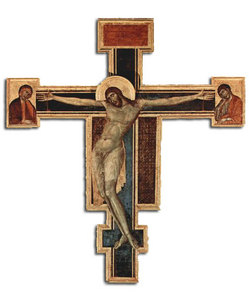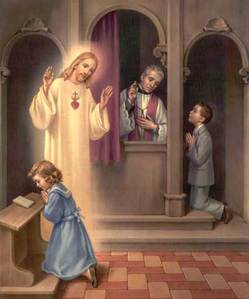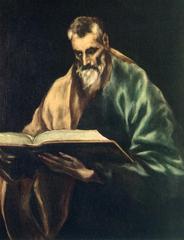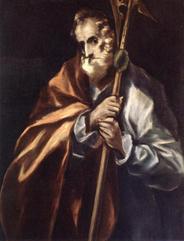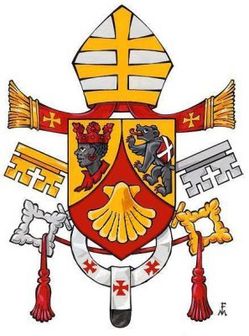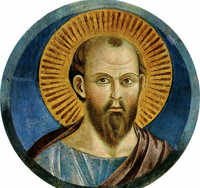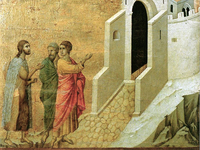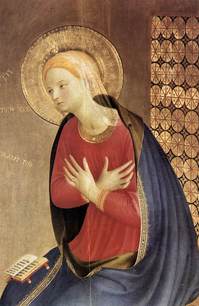[Part I]
Man wants happiness by nature. I want happiness. So I go out and buy a car. The car
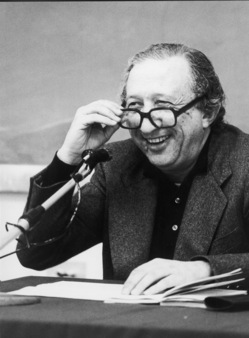 gives me a taste of happiness but does not fully satisfy the desire. So my desire becomes a question: “What will make me truly and fully happy?” Or perhaps, after I have bought the car and am still enjoying the taste of partial happiness that it gives me, I get into an accident and wreck my beautiful new possession. My simple desire finds itself full of questions: “Why was I not able to hold onto that thing and the satisfaction it gave me? Why do I lose things? Why is life so fragile, and is there something that won’t let me down?”
gives me a taste of happiness but does not fully satisfy the desire. So my desire becomes a question: “What will make me truly and fully happy?” Or perhaps, after I have bought the car and am still enjoying the taste of partial happiness that it gives me, I get into an accident and wreck my beautiful new possession. My simple desire finds itself full of questions: “Why was I not able to hold onto that thing and the satisfaction it gave me? Why do I lose things? Why is life so fragile, and is there something that won’t let me down?”
The more we take our own selves and our actions seriously, the more we perceive the mysteriousness and also the urgency of these questions, the fact that we cannot really avoid them’, they are necessarily at the root of everything we do. This is because it is the nature of the human being to expect something, to look for fulfillment in everything he does. And where is the limit to this desire to be fulfilled? There is no limit. It is unlimited. Every achievement, every possession opens up on a further possibility, a depth that remains to be explored, a sense of incompleteness, a yearning for more. We are like hikers in the mountains (an analogy Giussani is fond of): we see a peak and we climb to the top. When we arrive there, we have a new view, and in the distance we see a higher peak promising a still greater vista.
In the novel The Second Coming by Walker Percy, the character of Allie–a mentally ill woman living alone in a greenhouse–expresses the mysterious depths of human desire through her difficulties in figuring out what to do at four o’clock in the afternoon: “If time is to be filled or spent by working, sleeping, eating, what do you do when you finish and there is time left over?”
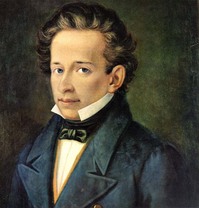 Giussani quotes the great 19th century Italian poet Giacomo Leopardi–who is speaking here in the persona of a shepherd watching his flock by night, conversing with the moon:
Giussani quotes the great 19th century Italian poet Giacomo Leopardi–who is speaking here in the persona of a shepherd watching his flock by night, conversing with the moon:
And when I gaze upon you,
Who mutely stand above the desert plains
Which heaven with its far circle but confines,
Or often, when I see you
Following step by step my flock and me,
Or watch the stars that shine there in the sky,
Musing, I say within me:
“Wherefore those many lights,
That boundless atmosphere,
And infinite calm sky? And what the meaning
Of this vast solitude? And what am I?
There are a couple of points about this striking poetic excerpt that are worth mentioning as illustrative of central themes in Giussani. The first point is this: note that the shepherd’s questions are so poignantly expressed “from the heart” (Musing, I say within me). They are “personal” questions we might say; that is, they are questions that seem deeply important to the shepherd’s own life, that emerge from the shepherd’s solitude as he watches the flocks by night and gazes at the moon. And yet, the questions themselves are really “philosophical” questions: “metaphysical” questions which ask about the relationship of the universe to its mysterious Source, and “anthropological” questions about the nature of the world, of man, of the self. Let us note these things only to emphasize that Giussani’s evaluation of the dynamic of the human heart is not exclusively concerned with the pursuit of external objects and the way in which these objects lead “beyond” themselves the acting person who engages them. Giussani stresses that the need for truth is inscribed on the human heart; the need to see the meaning of things is fundamental to man. Hence the “objectivity” required for addressing philosophical and scientific questions does not imply that these questions are detached from the “heart” of the person who deals with them. When the scientist scans that infinite, calm sky and that vast solitude with his telescope, he must record what he sees, not what he wishes he would have seen. In this sense, he must be “objective,” and his questions and methodology must be detached from his own particular interests. But what puts him behind that telescope in the first place is his own personal need for truth and this need grows and articulates itself more and more as questions emerge in the light of his discoveries. All of this could be applied by analogy to the researches carried out by a true philosopher.
The second point is this: Leopardi’s poem conveys with imaginative force the inexhaustibility of human desire and the questions through which it is expressed, or at least tends to be expressed insofar as man is willing to live in a way that is true to himself (several chapters of Giussani’s book are devoted to the various ways in which man is capable of distracting himself or ignoring the dynamic of the religious sense, or anesthetizing himself against its felt urgency). Even more importantly, he indicates that the unlimited character of man’s most fundamental questions points toward an Infinite Mystery, a mystery that man continually stands in front of with fascination and existential hunger but also with questions, because he is ultimately unable by his own power to unveil its secrets.
The experience of life teaches man, if he is willing to pay attention to it, that what he is truly seeking, in every circumstance is the unfathomable mystery which alone corresponds to the depths of his soul. Offer to man anything less than the Infinite and you will frustrate him, whether he admits it or not. Yet at the same time man is not able to grasp the Infinite by his own power. Man’s power is limited, and anything it attains it finitizes, reducing it to the measure of itself. The desire of man as a person, however, is unlimited, which means that man does not have the power to completely satisfy himself; anything that he makes is going to be less than the Infinite.
Here we begin to see clearly why Giussani holds that the ultimate questions regarding the meaning, the value, and the purpose of life have a religious character; and how it is that these questions are asked by everyone within the ordinary, non-theoretical reasoning process which he terms “the religious sense.” The human heart is, in fact, a great, burning question, a plea, an insatiable hunger, a fascination and a desire for the unfathomable mystery that underlies reality and that gives life its meaning and value. This mystery is something Other than any of the limited things that we can perceive or produce; indeed it is their fundamental Source. Therefore, the all-encompassing and limitless search that constitutes the human heart and shapes our approach to everything is a religious search. It is indeed, as we shall see in a moment, a search for “God.”
We seek an infinite fulfillment, an infinite coherence, an infinite interpenetration of unity between persons, an infinite wisdom and comprehension, an infinite love, an infinite perfection. But we do not have the capacity to achieve any of these things by our own
 power. Yet, in spite of this incapacity, in spite of the fact that the mystery of life–the mystery of happiness–seems always one step beyond us, our natural inclination is not one of despair, but rather one of dogged persistence and constant hope. Giussani insists that this hope and expectation is what most profoundly shapes the self; when I say the word “I,” I express this center of hope and expectation of infinite perfection and happiness that is coextensive with myself, that “is” myself, my heart. And when I say the word “you,” truly and with love, then I am acknowledging that same undying hope that shapes your self.
power. Yet, in spite of this incapacity, in spite of the fact that the mystery of life–the mystery of happiness–seems always one step beyond us, our natural inclination is not one of despair, but rather one of dogged persistence and constant hope. Giussani insists that this hope and expectation is what most profoundly shapes the self; when I say the word “I,” I express this center of hope and expectation of infinite perfection and happiness that is coextensive with myself, that “is” myself, my heart. And when I say the word “you,” truly and with love, then I am acknowledging that same undying hope that shapes your self.
The human person walks on the roads of life with his hands outstretched toward the mystery of existence, constantly pleading for the fulfillment he seeks–not in despair but
 with hope– because the circumstances and events of life contain a promise, they whisper continually that happiness is possible. This is what gives the human spirit the strength to carry on even in the midst of the greatest difficulties.
with hope– because the circumstances and events of life contain a promise, they whisper continually that happiness is possible. This is what gives the human spirit the strength to carry on even in the midst of the greatest difficulties.
Let us note two further points. First of all: I cannot answer the ultimate questions about the meaning of my life, and yet every fiber of my being seeks that answer and expects it. There must be Another who does correspond to my heart, who can fill the need that I am. To deny the possibility of an answer is to uproot the very foundation of the human being and to render everything meaningless. As Macbeth says, it would be as if life is “a tale told by an idiot, full of sound and fury, signifying nothing.” There must be an answer; and a human being cannot live without seeking that answer. Giussani says that a human being cannot live five minutes without affirming something, consciously or unconsciously, that makes those five minutes worthwhile. This is the basic structure of human reason at its root. “Just as an eye, upon opening, discovers shapes and colors, so human reason–by engaging the problems and interests of life–seeks and affirms some ultimate” value and significance which gives meaning to everything. But if we are honest, if we realize that we cannot fulfill ourselves, if we face the fact that the answer to the question of the meaning of life is not something we can discover among our possessions, or measure or dominate or make with our own hands, then we begin to recognize that our need for happiness points to Someone Else, to an Infinite Someone who alone can give us what we seek.
Second: this longing of my heart, this seeking of the Infinite is not something I made up or chose for myself. It is not my idea or my project or my particular quirk. It corresponds to the way I am, to the way I “find myself independent of any of my personal preferences or decisions. It is at the root of me. It is at the root of every person. It is in fact given to me, and to every person–this desire for the Mystery that is at the origin of everything that I am and do. In the depths of my own self there is this hidden, insatiable hunger and thirst, this “heart that says of You, ‘seek His face!'” (Psalm 27:8), this need for an Other that suggests His presence at the origin of my being. He gives me my being; He is “nearer to me than I am to myself as St. Augustine says. And He has made me for Himself, He has placed within each of us a desire that goes through all the world in search of signs of His presence. In the depths of our being, we are not alone. We are made by Another and for Another. “You have made us for Yourself, O Lord, and our hearts are restless until they rest in You,” says St. Augustine.
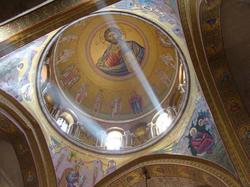 Thus, Giussani teaches that the Mystery of God is the only reality that corresponds to the “heart” of man: to the fundamental questions of human reason and the fundamental desire of the human freedom. It is this Infinite Mystery that the human person seeks in every circumstance of life. In our work, our loves, our friendships, our leisure time, our eating and drinking, our living and dying–in all of these activities we seek the face of the unfathomable Mystery that we refer to with poor words like “happiness” or “fulfillment” or “perfection.”
Thus, Giussani teaches that the Mystery of God is the only reality that corresponds to the “heart” of man: to the fundamental questions of human reason and the fundamental desire of the human freedom. It is this Infinite Mystery that the human person seeks in every circumstance of life. In our work, our loves, our friendships, our leisure time, our eating and drinking, our living and dying–in all of these activities we seek the face of the unfathomable Mystery that we refer to with poor words like “happiness” or “fulfillment” or “perfection.”
St. Thomas Aquinas says that God is happiness by His Essence, and we are called to participate in His happiness by being united to Him who is Infinite Goodness. We are made for happiness. By our very nature we seek happiness. To be religious, then, is to recognize that God alone can make us happy. It is to recognize the mysterious existential reflection of God’s infinite truth, goodness, and beauty that radiates from every creature, that lights up the circumstances of our lives, and calls out to us through all the opportunities that life presents to us.
In this sketch of Giussani’s understanding of what he calls “the religious sense,” we can see the profound reflections that underlie his great apostolate: his effort to teach his students that religion cannot be relegated to the fringes of life. Giussani insisted to his students that religion was not to be simply delineated as one aspect of life: a comfort for our sentiments, a list of ethical rules, a foundation for the stability of human social life (even though it entails such things as various consequences that follow from what it is in itself). Rather, the realm of the religious is coextensive with our happiness. The proper position of the human being is to live each moment asking for God to give him the happiness he seeks but cannot attain by his own power. Asking for true happiness–this is the true position of man in front of everything. Giussani often points out that “structurally” (that is, by nature), man is a “beggar” in front of the mystery of Being.
This brings us to the final chapters of The Religious Sense, in which Giussani analyses the dramatic character of this truth about man, both in terms of the very nature of this position of “being a beggar” and in terms of how this truth has played itself out in the great drama of human history. We could all too easily allow ourselves to be lulled to sleep by all of this lovely language about desiring the Infinite Mystery, and end up missing the point. The image of the beggar ought not to be romanticized in our imaginations. Generally people don’t like to be beggars, and they don’t have much respect for beggars. We should be able to attain what we need by our own efforts; is this not a basic aspect of man’s sense of his own dignity? And yet the very thing we need most is something that we do not have the power to attain, something we must beg for. This is the true human position, and yet it is not as easy to swallow as it may at first appear.
We are beggars in front of our own destiny because the Infinite One for whom our hearts have been made is always beyond the things of this world that point toward Him but do not allow us to extract His fullness from them by our own power. This fact causes a great tension in the experience of the human person–a “vertigo,” a dizziness, Giussani calls it –and there results the inevitable temptation to shrink the scope of our destiny, to attempt to be satisfied with something within our power, something we are capable of controlling and manipulating. This, says Giussani, is the essence of idolatry. Instead of allowing ourselves to be “aimed” by the beauty of things toward a position of poverty and begging in front of the Beauty who is “ever beyond” them, the Mystery of Infinite Splendor who sustains them all–who holds them in the palm of his hand–we try instead to grasp these finite things and make them the answer to our need for the Infinite.
This great tension at the heart of man’s religious sense– and the historical tragedy of man’s failure to live truly according the historical tragedy of man’s failure to live truly according to the religious sense–generates within the heart of man the longing for salvation. Corresponding to this longing, Giussani says, is the recognition of the possibility of revelation. Might not the Infinite Mystery make Himself manifest in history, create a way within history for me to reach Him? Might not the Infinite Mystery who constitutes my happiness approach me, condescend to my weakness, guide my steps toward Him? This possibility–the possibility of Divine Revelation–is profoundly “congenial” to the human person, because man feels profoundly his need for “help” in achieving his mysterious destiny.
The Religious Sense concludes on this note: the possibility of revelation. Here the ground is laid for the second book in what might be called Giussani’s catechesis of Christian anthropology: The Origin of the Christian Claim. In this book, Giussani will propose that Christ is the revelation of God in history, the Mystery drawn close to man’s life–walking alongside the human person. Christ is the great Divine help to the human person on the path to true happiness.
This an excerpt of the essay, Man in the Presence of Mystery. The author, John Janaro, professor of theology at Christendom College, delivered this paper in 1998.
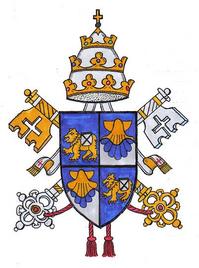 “[B]y prayer of petition we express awareness of our relationship with God. We are creatures who are not our own beginning, not the masters of adversity, not our own last end. We are sinners who as Christians know that we have turned away from our Father” (CCC 2629). Petition is not the highest kind of prayer, but precisely because it is not, it is humble and honest, and thus pleasing to God. (Prayer, CIS Hart Series booklet)
“[B]y prayer of petition we express awareness of our relationship with God. We are creatures who are not our own beginning, not the masters of adversity, not our own last end. We are sinners who as Christians know that we have turned away from our Father” (CCC 2629). Petition is not the highest kind of prayer, but precisely because it is not, it is humble and honest, and thus pleasing to God. (Prayer, CIS Hart Series booklet)